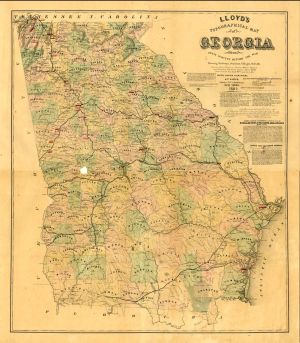 Today Confederate forces on land and water attack Union-held Plymouth, North Carolina. The dual-fronted offensive, highlighted by the recently-launched ironside CSS Albermarle, overwhelms the Union defenders. In this second-largest battle fought in North Carolina during the war, the Confederates notch an impressive victory. For its part, the Albemarle rams two Union ships, putting them out of commission, while forcing the remaining federal fleet to retreat down river, securing the victory for the Confederacy.
Today Confederate forces on land and water attack Union-held Plymouth, North Carolina. The dual-fronted offensive, highlighted by the recently-launched ironside CSS Albermarle, overwhelms the Union defenders. In this second-largest battle fought in North Carolina during the war, the Confederates notch an impressive victory. For its part, the Albemarle rams two Union ships, putting them out of commission, while forcing the remaining federal fleet to retreat down river, securing the victory for the Confederacy.
While the victory is welcome news to the Confederacy, war weariness and worry are far from alleviated. A revival now taking place at the First Baptist Church of Macon, Georgia, illustrates the solemnity that pervades the South as spring battles loom so very close. The church is pastored by Ebenezer W. Warren, a whole-hearted, unrelenting advocate of black slavery.
These meetings continue very interesting–fourteen in all have been baptized, and four or five more candidates awaiting the ordinance. The meetings have continued six or seven weeks and have continually increased in interest: for the last two weeks morning prayer meetings have been held mostly by the church members for the special presence of the Holy Spirit. Tho’ the church is revived, and though it manifests much earnestness, yet in the ordinary acceptation of the term this is not what is called a revival. All is calm and quiet: the nightly preaching is solemn and earnest; and the feeling deep and serious, and mourners constantly come forward for prayer.
Rev. E. W. Warren, continues unflagging in his endeavors to maintain the inter- [?] of the meetings, and has reason to feel gratified at his success.
In the Hospitals there is much religious interest, the chaplains preach constantly–Rev. F. M. Haygood every night. Some interesting conversations have occurred among the soldiers.
The ambiguous word “interesting” seemingly captures the precariousness of the times. Everyone wonders what will happen next. Eyes are often cast northward toward Atlanta, where news of Sherman’s advance from Chattanooga to the north Georgia city is expected any day. Many of the hospital conversations likely focus on Atlanta. Should Sherman successfully take Atlanta, many citizens will flee southward to Macon. Some, anticipating the battle, have already relocated.
Slaves are on edge as much as whites. If any slave members are present at the revival meetings of First Baptist Macon, they are silently petitioning God for a Union victory and thus their freedom. The prayers of black members clash with those of white church members in a spiritual tempest that grows ever more fervent within the church house–a mere one among thousands–where ungodly convictions about humanity are fiercely guarded.
Sources: Battle of Plymouth (link); “CSS Albemarle,” Historic Albemarle Tours (link); Gary McCullough, “Civil War Returns to Plymouth, N.C., in April,” Charlotte Observer, April 3, 2014 (link); “Meetings in Macon Church,” Christian Index, April 22, 1864


